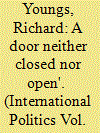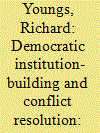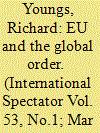| Srl | Item |
| 1 |
ID:
088474


|
|
|
|
|
| Publication |
2009.
|
| Summary/Abstract |
Ukraine provides evidence of very different Common Foreign and Security Policy negotiating dynamics. In the run up to the country's Orange Revolution, significant differences persisted between member states over how the European Union (EU) should support Ukraine's democratic transition. A combination of normative entrapment and co-operative bargaining ensured that 'maximalist' and 'minimalist' member states united around a common position in support of the Orange Revolution. In subsequent debates over whether the EU should offer Ukraine a membership prospect, however, lowest common denominator dynamics prevailed. This case additionally demonstrates that both before and after Ukraine's democratic transition very specific external geostrategic factors played an important role in conditioning EU policy outcomes
|
|
|
|
|
|
|
|
|
|
|
|
|
|
|
|
| 2 |
ID:
053103


|
|
|
| 3 |
ID:
158385


|
|
|
|
|
| Summary/Abstract |
Politicians, diplomats and analysts commonly assume that commitment to multilateralism and liberal norms is part of the EU’s very DNA. Increasingly, however, the EU’s commitment to the liberal global order is more selective. We demonstrate the shift to a more contingent liberalism by examining the EU’s recent record in relation to four different challenges: international trade; US leadership; Russian actions in the eastern neighbourhood; and security in the Middle East. We speculate on what this may portend for the EU’s self-identity, European interests and the integrity of the prevailing global order.
|
|
|
|
|
|
|
|
|
|
|
|
|
|
|
|
| 4 |
ID:
075191


|
|
|
|
|
| Publication |
Boulder, Lynne Rienner Publishers, 2006.
|
| Description |
v, 255p.
|
| Standard Number |
1588264769
|
|
|
|
|
|
|
|
|
|
|
|
Copies: C:1/I:0,R:0,Q:0
Circulation
| Accession# | Call# | Current Location | Status | Policy | Location |
| 051978 | 327.4056/YOU 051978 | Main | On Shelf | General | |
|
|
|
|
| 5 |
ID:
157098


|
|
|
|
|
| Publication |
London, I B Tauris, 2018.
|
| Description |
xii, 242p.pbk
|
| Standard Number |
9781788310574
|
|
|
|
|
|
|
|
|
|
|
|
Copies: C:1/I:0,R:0,Q:0
Circulation
| Accession# | Call# | Current Location | Status | Policy | Location |
| 059271 | 341.242/YOU 059271 | Main | On Shelf | General | |
|
|
|
|
| 6 |
ID:
098801


|
|
|
| 7 |
ID:
135873


|
|
|
|
|
| Summary/Abstract |
A truly democratic European Union seems to have become the graal of European politics, the project's redemptive promise and unreachable horizon. Much has been written about the gap between promise and performance and about the obstacles to EU democratization. Here, we suggest that one way to apprehend the ‘democratic deficit’ debate as it has evolved in the wake of the euro crisis is to think of it as a ‘democratic trilemma’. We argue that European legitimacy requires responses in different realms: first, an acknowledgement of Europe's ‘transnational democratic interdependence’; second, an anchoring of the functionalist European superstructure in ‘national democratic legitimacy’; and third, a grounding of both European and national power in ‘local democratic legitimacy’. While the very notion of trilemma points to the tensions that arise in trying to satisfy these requisites simultaneously, we nevertheless need to look for ways of alleviating the trilemma rather than coming up with democratic magic bullets in a single one of these realms. While our main goal is to reframe and open up the debate around the key concepts of empowerment, mutual recognition and flexibility, we also provide examples of what this may mean.
|
|
|
|
|
|
|
|
|
|
|
|
|
|
|
|